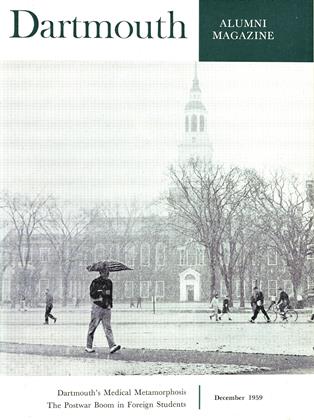To THE EDITOR:
For many years I have been of the opinion that the barrel of rum used by Eleazar Wheelock in celebrating the founding of Dartmouth College was not just New England rum, but could be pinpointed as Old Medford Rum, distilled in Medford, Mass., and purchased here in Medford, not Boston.
After reading the article, Dartmouth'sOldest "Old Tradition" by John E. Johnson '66, reprinted in the November 1958 DARTMOUTH ALUMNI MAGAZINE, I made an intensive search in the History of Medford, a book of almost six hundred pages, written by Charles Brooks, from Medford's first settlement in 1630 up to 1855, and revised and brought up to 1885 by James M. Usher. Brooks was an enthusiastic and painstaking antiquarian; in no case in his History ofMedford did he record a fact, or draw an inference, without having satisfactory historical evidence of its truth.
The History of Medford states that Medford was a part of a great thoroughfare, and was second to none in importance to all travelers, from the east and north, who were going to Boston. For 150 years up to 1800, it was on the shortest route for all land travel to Boston from New Hampshire, Maine and Vermont. Boston was five miles away, which made Medford a convenient stopping place overnight. No town of its size, in the state, had so many taverns or offered better quality in bed and food. Every night during the winter the taverns were filled with farmers from New Hampshire and Vermont. As a trading center, Medford could furnish the staple articles of iron, steel, lead, salt, molasses, sugar, rum, tea, codfish, chocolate, guns, and powder to country traders at a lower price than they could get them in Boston, because of Medford's large shipping industry. Barter was the most common form of trade. It was a common sight to see twenty to thirty country pungs gathered about the doors of Medford's traders, discharging and taking on their loads.
Medford also had three large distilleries in full action. Distillation was not only lawful, but was a highly respectable business in those days. The most famous of these distilleries was the one in Medford Square owned by Benjamin Hall, who also had a large store for wholesale barter. The rum he distilled was the Old Medford Rum, which became world famous, due to its flavor attributed to the singular properties of a most copious spring of peculiarly good water which issued from the earth under the distillery.
From the above data, it stands to reason that the agents sent by Eleazar Wheelock to buy a barrel of rum and a keg of molasses did not drive the extra ten miles round-trip to Boston, when they could buy the same rum and molasses in Medford, at a lower price. To top it off, they could have a free glass of rum at the distillery, as was the custom in those days. The smell of distilling rum greeted the nostrils of all travelers as they came into Medford Square.
Daniel Webster, or Black Dan as John Johnson '66 called him, was a frequent visitor to Medford in his day. Webster had friends in Medford to be sure, but that smell of rum was quite a lure. The desk Daniel Webster used at Dartmouth is here in Medford, as well as his yellow vest and other possessions.
The History of Medford states that in 1777 rum was sold by the barrel for 3s, 10d per gallon. Where did Eleazar Wheelock get that amount of money for two barrels as mentioned in Johnson's article? It is possible that Eleazar might have traded skins of wild animals or something else for the rum and molasses, for Mr. Benjamin Hall also owned a tannery and, as I said before, barter was the most common form of trade in those days.
Medford, Mass.
P.S. In the February 1959 DARTMOUTH ALUMNI MAGAZINE I noticed in The Hanover Scene by the late Bill McCarter '19, a mention about the regular service in chocolate eclairs within the dorms at night in his day. I was the student who furnished that service with my eclairs, cup cakes, jelly doughnuts and cream puffs, each wrapped individually in wax paper. In the same article he mentioned John Spaghetti. This past year I finished writing a poem of 62 lines entitled "John Spaghetti," about the same man. For over thirty years I have traded every day with John Spaghetti's son, who runs a store within a block of my house. The last time I saw John Spaghetti was just before he went back to Italy to stay. He was in his son's store for a visit. His right name was John Bernardi.
 View Full Issue
View Full Issue
More From This Issue
-
 Feature
FeatureDartmouth's Medical Metamorphosis
December 1959 -
 Feature
FeatureStudents from Abroad
December 1959 By J.B.F. -
 Feature
FeatureMary Baker Eddy and Dartmouth
December 1959 By JOHN B. STARR '61 -
 Feature
FeatureSTEFANSSON
December 1959 By ALAN COOKE '55 -
 Class Notes
Class Notes1921
December 1959 By JOHN HURD, LINCOLN H. WELD -
 Class Notes
Class Notes1918
December 1959 By THOMAS E. SHIRLEY, W. CURTIS GLOVER
Article
-
 Article
ArticleADDRESSES UNKNOWN APRIL 6, 1916
May 1916 -
 Article
ArticlePRESIDENT HOPKINS REPLIES TO SUPERINTENDENT THOMPSON
February 1919 -
 Article
ArticleCOPS or CORPSES ?
December 1948 -
 Article
ArticlePrize Secretary
June 1954 -
 Article
ArticleMedical School
OCTOBER 1970 By Harry W. Savage M’27 -
 Article
ArticleGREETINGS
November 1950 By Peter B. Martin '51

